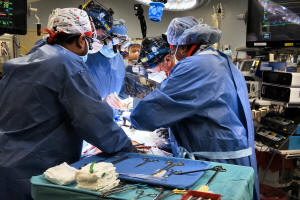Son calls father's pig-heart transplant a miracle of science
 Send a link to a friend
Send a link to a friend
 [January 14, 2022]
By Natasa Bansagi [January 14, 2022]
By Natasa Bansagi
(Reuters) - The son of a transplant
recipient who was implanted with a genetically modified pig heart in a
first-of-its-kind surgery, called his father's procedure "a miracle."
The surgery, performed by a team at the University of Maryland Medicine
on Jan. 7, is among the first to demonstrate the feasibility of a
pig-to-human heart transplant, a field made possible by new gene editing
tools.
If proven successful, scientists hope pig organs could help alleviate
shortages of donor organs. For 57-year-old David Bennett of Maryland,
the heart transplant was his last option.
"This is significant for my dad, for the United States, for the world,"
David Bennett Jr., the patient's son, said on Thursday. "This is
groundbreaking, this is remarkable and frankly, this is a miracle."

"I myself have some heart issues at 37 years old so my dad is certainly
changing the future for even myself."
On the morning of the surgery, the transplant team removed the pig's
heart and placed it into a special device to preserve its function until
the surgery.
[to top of second column]
|

Surgeon Bartley P. Griffith, MD leads a team conducting a successful
transplant of a genetically-modified pig heart on David Bennett, a
57-year-old patient with terminal heart disease, at University of
Maryland Medical Center in Baltimore, Maryland, U.S. January 7,
2022. Picture taken January 7, 2022. University of Maryland School
of Medicine (UMSOM)/Handout via REUTERS.
 "He was in the operating room three
days straight. He's got a lot of swelling throughout his body, and
so he's suffering a great deal. This healing is going to be a
process and so again, the first words out of his mouth were 'I can't
take this' but I know how strong my dad is."
Pigs have long been a tantalizing source of potential transplants
because their organs are so similar to humans.
Prior efforts at pig-to-human transplants have failed because of
genetic differences that caused organ rejection or viruses that
posed an infection risk.
Scientists have tackled that problem by editing away potentially
harmful genes and adding human genes linked with immune acceptance.
(Reporting by Natasa Bansagi in Gdansk; Additional reporting by
Julie Steenhuysen in Chicago; Editing by Lisa Shumaker)
[© 2022 Thomson Reuters. All rights
reserved.] This material may not be published,
broadcast, rewritten or redistributed.
Thompson Reuters is solely responsible for this content. |